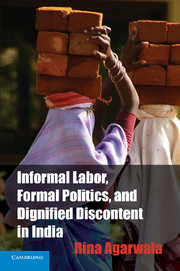Book contents
- Frontmatter
- Contents
- List of Tables
- List of Figures
- Acknowledgments
- Abbreviations
- 1 Introduction
- 2 Struggling with Informality
- 3 The Success of Competitive Populism
- 4 Communism's Resistance to Change
- 5 The Minimal Gains of Accommodation
- 6 Conclusion
- Appendix I Photos of Informal Workers in Construction and Bidi
- Appendix II The Evolution of the Count of Informal Workers
- Appendix III Interview Methodology
- References
- Index
6 - Conclusion
Dignifying Discontent
Published online by Cambridge University Press: 05 March 2013
- Frontmatter
- Contents
- List of Tables
- List of Figures
- Acknowledgments
- Abbreviations
- 1 Introduction
- 2 Struggling with Informality
- 3 The Success of Competitive Populism
- 4 Communism's Resistance to Change
- 5 The Minimal Gains of Accommodation
- 6 Conclusion
- Appendix I Photos of Informal Workers in Construction and Bidi
- Appendix II The Evolution of the Count of Informal Workers
- Appendix III Interview Methodology
- References
- Index
Summary
For decades, workers in rich and poor countries organized around a model that forced the state to hold employers responsible for ensuring their security and basic needs. In return, workers promised to provide their labor without strife. Although nations varied in the degree of protection promised and provided to workers, the ideal contract remained consistent across nations, and workers enjoyed, at the very least, an ideological and material claim to livelihood rights. Since the 1980s, however, the normative roles of the state and of workers have changed, and the conventional contract between them has begun to sever as a result. State governments are increasingly portraying informal, unprotected workers as the ideal worker, even though they operate outside state regulation. Multilateral institutions and public media are tagging governments that retreat from their welfare functions as modern and efficient. Perhaps most striking for students of development, the percentage of people living in perpetual insecurity – with no guaranteed benefits from either an employer or a state – is increasing.
At the source of these trends lies a new economic and political model of development that is proliferating throughout the world as countries liberalize their economies and integrate with one another. Under this model, states and firms pursue economic growth through competition in a global marketplace. To remain competitive, firms argue that they must reduce labor costs by hiring informal workers who, by definition, are not protected by state law. States are supporting firms in their decision to hire unprotected labor by initiating incentive programs that encourage formally protected workers to leave their jobs, creating free-trade zones where firms are not required to comply with labor laws, and contracting public-sector services to private-sector firms that can hire informally. As opportunities in the formal sector diminish, a growing proportion of household members are forced to engage in informal employment.
- Type
- Chapter
- Information
- Publisher: Cambridge University PressPrint publication year: 2013
- 1
- Cited by



